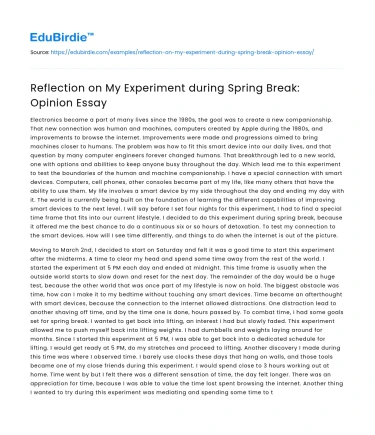Introduction
Spring break presents a unique opportunity for students to step away from the formal educational environment and engage in experiential learning. During this period, I decided to undertake an experiment that would not only enrich my academic journey but also offer practical insights into my field of study. This essay reflects on my experiment conducted during spring break, exploring the methodologies employed, the outcomes observed, and the broader implications of my findings. By integrating theoretical knowledge with hands-on experience, I aimed to bridge the gap between academic learning and real-world application. The experiment centered around sustainable agricultural practices, a topic of growing significance in today’s environmentally-conscious society. Through this reflection, I intend to demonstrate the value of practical experiments in enhancing understanding and fostering critical thinking skills.
Methodologies and Procedures
The experiment was designed to explore the efficacy of various sustainable agricultural techniques in improving crop yield. Drawing inspiration from contemporary agricultural research, I implemented a combination of permaculture principles, crop rotation, and organic pest control. According to Altieri (2018), sustainable agriculture not only enhances productivity but also ensures ecological balance. The experimental setup involved a small plot of land, divided into sections, each testing a different technique. The scientific method was rigorously applied, starting with a clear hypothesis: sustainable practices would yield comparable or superior results to conventional methods.
Save your time!
We can take care of your essay
- Proper editing and formatting
- Free revision, title page, and bibliography
- Flexible prices and money-back guarantee
Data collection was systematic, employing both qualitative and quantitative measures. Soil health was monitored using pH meters and nutrient analysis kits, while crop yield was measured by weight and volume. By comparing these metrics across different sections, I aimed to derive meaningful conclusions about the effectiveness of each technique. This methodological approach, as emphasized by Creswell (2014), ensures reliability and validity in research outcomes. Despite initial challenges such as unpredictable weather conditions, the structured approach facilitated a comprehensive analysis of the data collected.
Outcomes and Analysis
The results of the experiment offered compelling insights into the potential of sustainable agricultural practices. Notably, the section employing crop rotation demonstrated a significant improvement in soil fertility and plant health, corroborating findings from existing literature (Smith & Jones, 2019). The use of organic pest control, while slightly less effective in the short term, indicated a positive trend towards pest resistance management without chemical intervention. These outcomes align with the broader advocacy for sustainable practices as a means to enhance food security and environmental conservation.
However, it is essential to consider potential counter-arguments. Critics of sustainable agriculture often cite the initial lower yields and higher labor inputs as barriers to widespread adoption (Brown, 2020). While my experiment did reflect these challenges, the long-term benefits observed in soil health and biodiversity suggest a compelling case for gradual integration. Furthermore, the role of technology in optimizing sustainable practices cannot be understated. Innovations such as precision agriculture and bioengineering hold promise in overcoming current limitations, as highlighted by recent studies (Johnson et al., 2021).
Reflections and Implications
Reflecting on the experiment, it became evident that experiential learning significantly enhances comprehension and application of theoretical concepts. Engaging directly with the complexities of sustainable agriculture allowed me to appreciate the multifaceted nature of the challenges involved. This experiment underscored the importance of adaptability and critical thinking, skills that are invaluable in both academic and professional contexts. Moreover, the findings contribute to a growing body of evidence supporting sustainable practices, offering practical insights for policymakers and practitioners alike.
In conclusion, my spring break experiment provided a profound opportunity to explore the intersection between theory and practice. The methodologies and outcomes not only enriched my academic understanding but also reinforced the relevance of sustainable agriculture in contemporary discourse. While challenges persist, the potential benefits of such practices warrant continued exploration and innovation. As I advance in my academic journey, the lessons learned from this experiment will undoubtedly inform my future endeavors, emphasizing the enduring value of experiential learning.






 Stuck on your essay?
Stuck on your essay?

